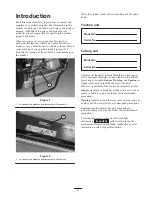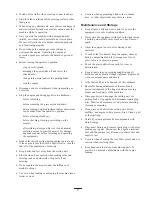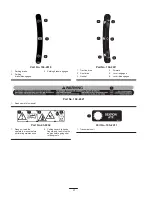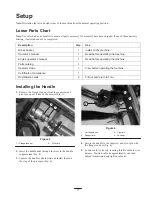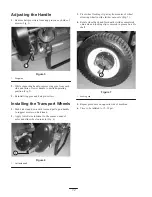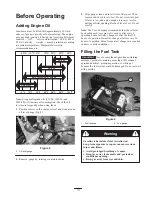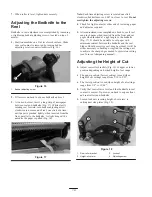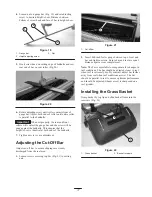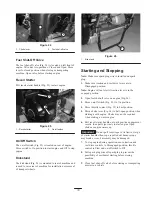
4
Safety
This machine meets or exceeds CEN standard EN
836:1997, ISO standard 5395:1990, and ANSI
B71.4-1999 specifications in effect at the time of
production when the Operator Presence Kit, Part No.
105–5333 is installed.
Improper use or maintenance by the operator or owner
can result in injury. To reduce the potential for injury,
comply with these safety instructions and always pay
attention to the safety alert
symbol, which means
CAUTION, WARNING, or DANGER—“personal
safety instruction.” Failure to comply with the
instruction may result in personal injury or death.
Safe Operating Practices
The following instructions are from the CEN standard EN
836:1997, ISO standard 5395:1990, and ANSI
B71.4-1999.
Training
•
Read the Operator’s Manual and other training
material carefully. Be familiar with the controls, safety
signs, and the proper use of the equipment.
•
Never allow children or people unfamiliar with these
instructions to use or service the mower. Local
regulations may restrict the age of the operator.
•
Never mow while people, especially children, or pets
are nearby.
•
Keep in mind that the operator or user is responsible
for accidents or hazards occurring to other people or
their property.
•
The owner/user can prevent and is responsible for
accidents or injuries occurring to himself or herself,
other people, or property.
Preparation
•
While mowing, always wear substantial footwear, long
trousers, hard hat, safety glasses, and ear protection.
Long hair, loose clothing, or jewelry may get tangled
in moving parts. Do not operate the equipment when
barefoot or wearing open sandals.
•
Thoroughly inspect the area where the equipment is to
be used and remove all objects which may be thrown
by the machine.
•
Warning—Fuel is highly flammable. Take the
following precautions:
–
Store fuel in containers specifically designed for
this purpose.
–
Refuel outdoors only and do not smoke while
refuelling.
–
Add fuel before starting the engine. Never remove
the cap of the fuel tank or add fuel while the
engine is running or when the engine is hot.
–
If fuel is spilled, do not attempt to start the engine
but move the machine away from the area of
spillage and avoid creating any source of ignition
until fuel vapors have dissipated.
–
Replace all fuel tanks and container caps securely.
•
Replace faulty silencers.
•
Evaluate the terrain to determine what accessories and
attachments are needed to properly and safely perform
the job. Only use accessories and attachments
approved by the manufacturer.
•
Check that operator’s presence controls, safety
switches and shields are attached and functioning
properly. Do not operate unless they are functioning
properly.
Operation
•
Do not operate the engine in a confined space where
dangerous carbon monoxide fumes can collect.
•
Mow only in daylight or in good artificial light.
•
Before attempting to start the engine, disengage all
blade attachment clutches, shift into neutral, and
engage the parking brake.
•
Do not use on slopes of more than
–
5
°
when mowing on side hills;
–
10
°
when mowing uphill;
–
15
°
when mowing downhill.
•
Remember there is no such thing as a safe slope.
Travel on grass slopes requires particular care. To
guard against overturning:
–
do not stop or start suddenly when going up or
downhill;
–
engage clutch slowly, always keep machine in gear,
especially when travelling downhill;
–
machine speeds should be kept low on slopes and
during tight turns;
–
stay alert for humps and hollows and other hidden
hazards;
–
never mow across the face of the slope, unless the
mower is designed for this purpose.
•
Stay alert for holes in the terrain and other hidden
hazards.



